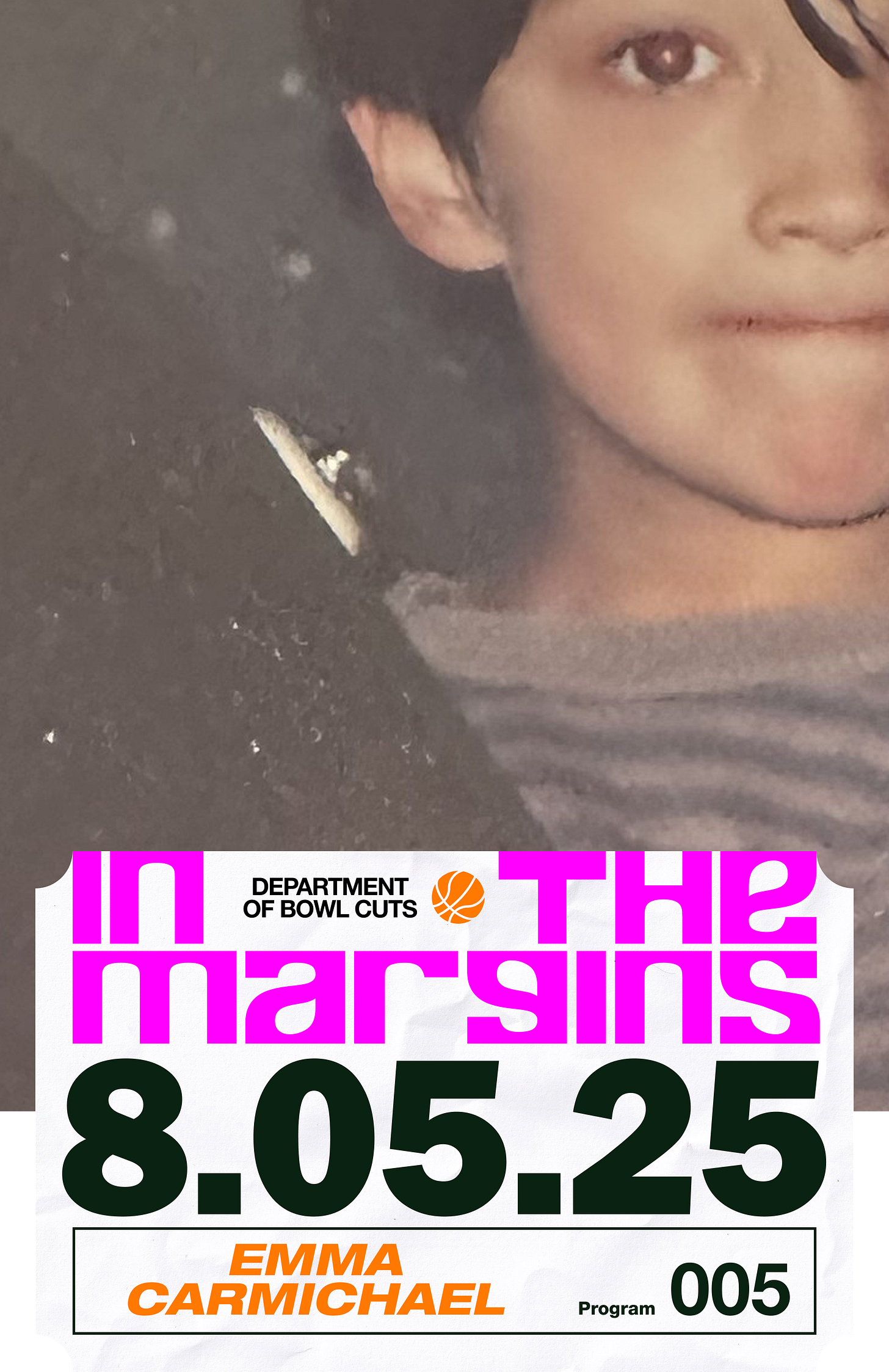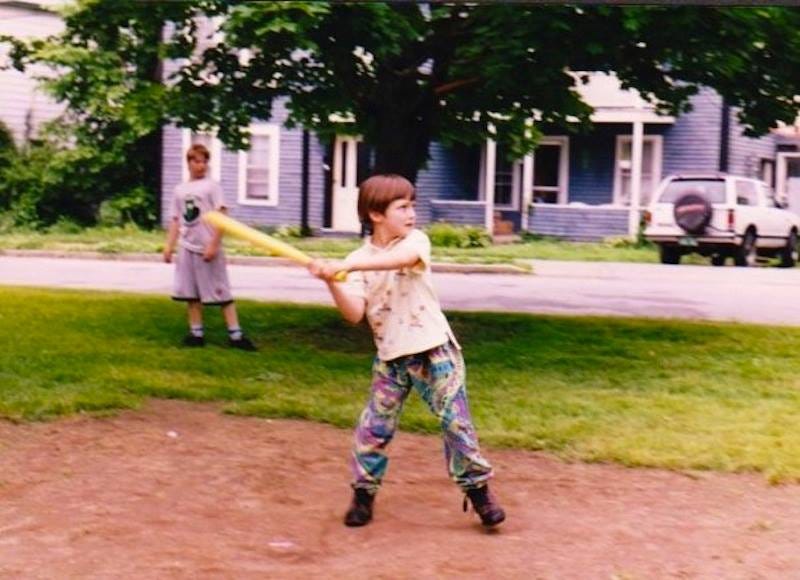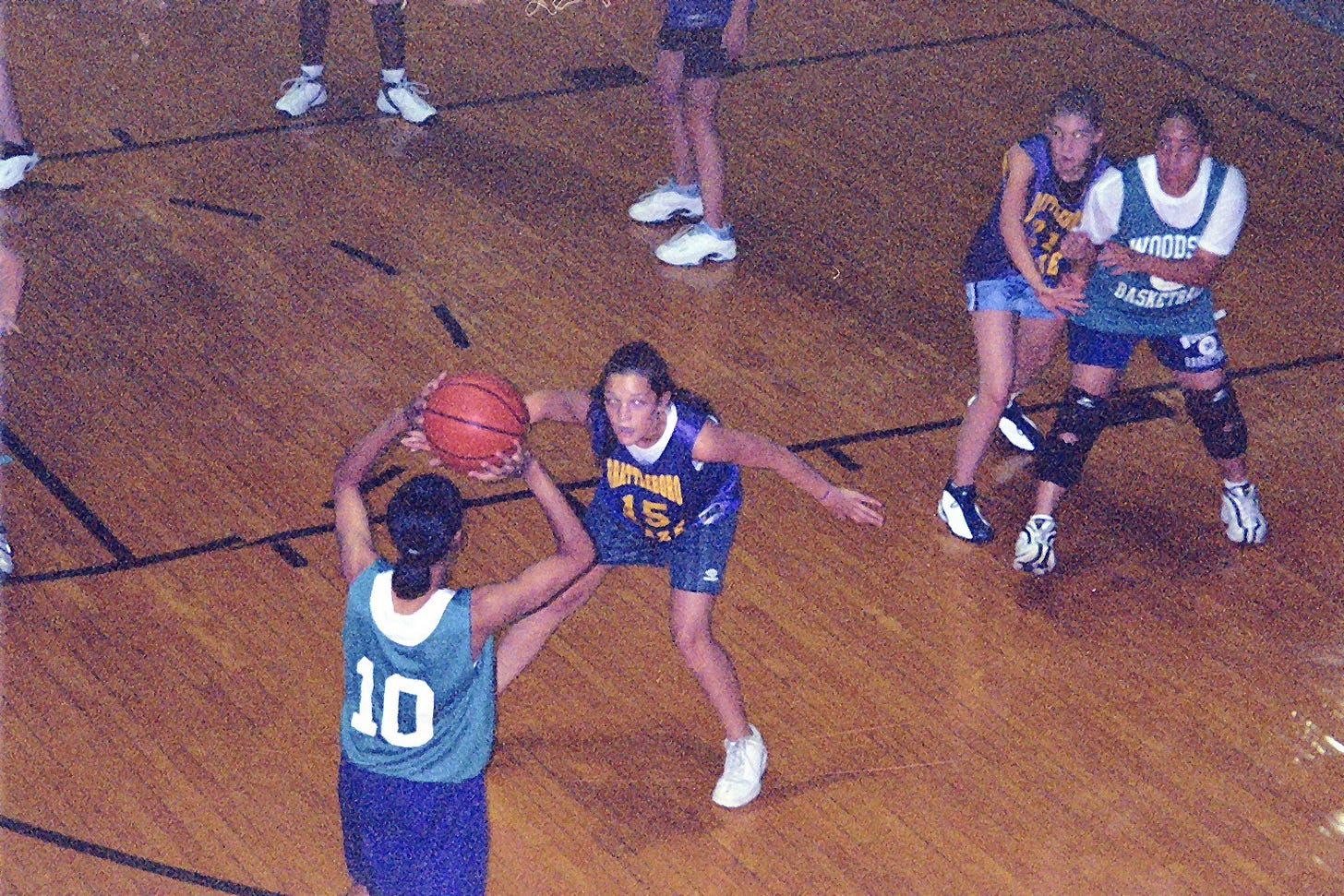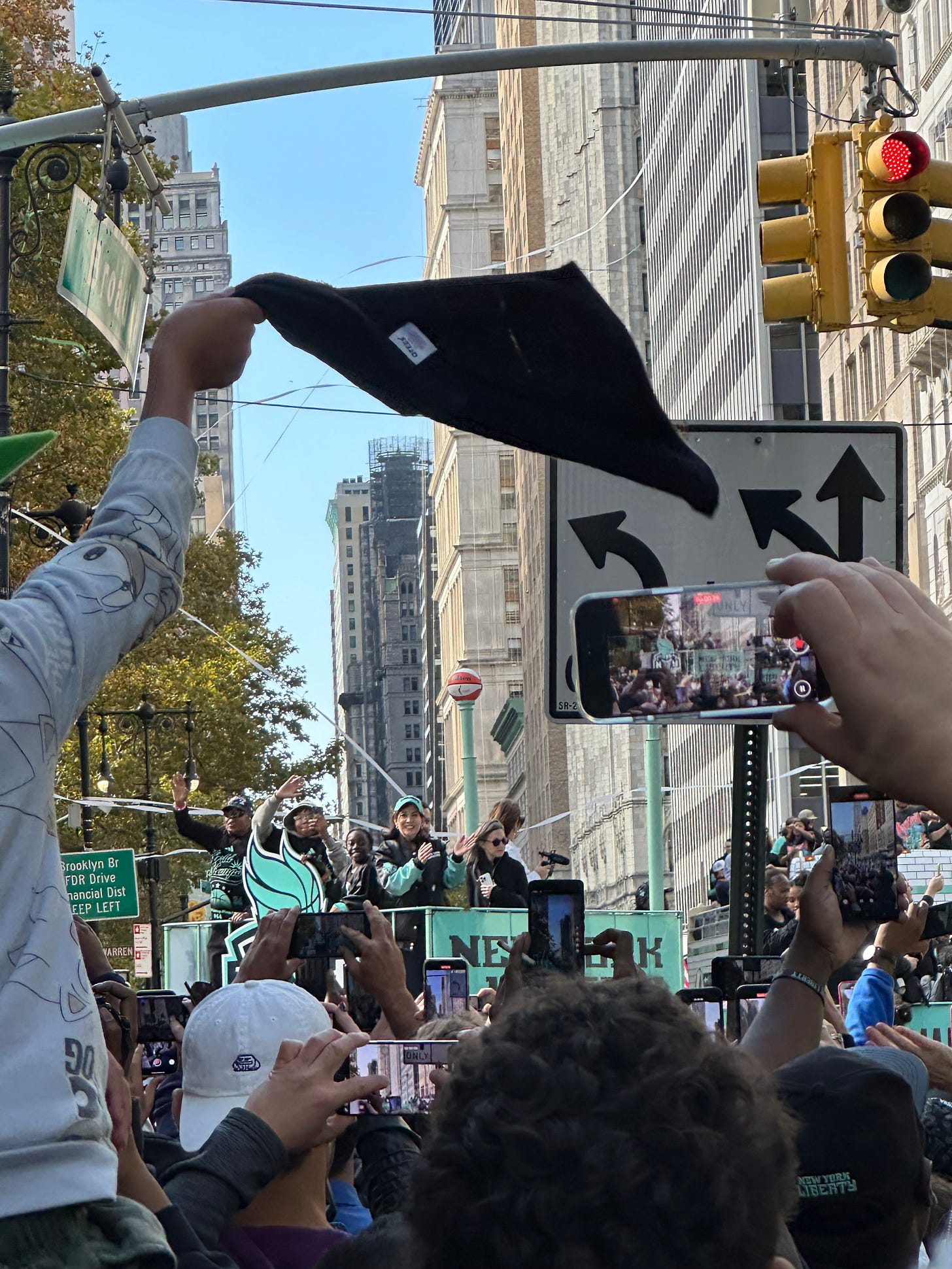Something To Play For
Coming of age as a 90s "tomboy"
It used to be that the world didn't make it easy to be a girl who loved basketball. In the early ‘90s, it required something like social contortion—which makes sense, gymnastics being one of the few sports it was considered acceptable to be good at. On the court we could be athletic but not too muscular, spirited but not overly eager, competitive but never aggressive. When it came to talking about sports, we could be curious in a deferential way, but definitely never demonstrably knowledgeable. That would be unattractive, and also weird. What kind of girl knows about motion offenses? It was considered cute to pretend we didn’t really understand what the hell was going on in a game at any given moment, or that we didn’t have a favorite dunker. But of course we did, privately.
Under these conditions, how did any of us emerge intact? The answer was that we didn’t, not really. We came up with ways to hide shifting parts of our nascent identities—to turn down the dial on our wattage a bit, or sometimes a lot, and blend in with the rest of the crowd. It’s miraculous, really, that any girl came out of that kind of adolescence with a coherent enough sense of herself to face the world. But that constant act of compromise was an essential element of who we became, too—a little bit tougher, a lot more savvy, almost virtuosic in our ability to shapeshift and fit in. It was hard to be a girl who liked sports. We had to find ways to make it work.
Occasionally, we looked around and noticed that the coast was clear and that it might be safe to fully inhabit ourselves for a moment. Take me, for instance: I grew up with brothers in a neighborhood full of boys. They cut their hair short, gashed their knees skateboarding, and no one ever objected when they were sweaty and gross, which seemed to be all of the time. I wanted more than anything to share their kind of freedom. But more than that, I just wanted to play sports. When I was six, I started joining their games in the park across the street from our house—first wiffle ball and then two-hand touch and then, once we’d moved to a driveway, endless rounds of HORSE and 21. The boys treated me with skepticism at first, if not outright disdain. I had a bowl cut and wore my older brother’s hand-me-down Zubaz pants and high tops, and plus, I was a better wide receiver than most of them. It must have been very confusing. But there was one summer where it began to feel okay, like I’d finally earned my spot. I moved up in the team drafting order, got nods of approval and high-fives after a good post route or a tough basket. Accordingly, I started to relax—to lean into my abilities instead of preemptively shirking from them. I started to think that maybe I made sense.
This was a short-lived respite. At the beginning of the third grade I looked around and noticed I was the only girl in my class regularly sporting skinned knees and dirty fingernails, and that it was no longer considered normal to hang with the boys like that. If I wanted to fit in, I would have to adjust accordingly. So I grew my hair long, got my ears pierced; I wore a jean skirt and even a headband for class picture day. I selected and developed a crush on an appropriate member of the boy band du jour. I stopped playing football in the park across the street and started putting teeny-bopper posters from J-14 on my wall. I mimicked the more conventional forms of girlhood on display around me and did my best to play the new part.
In the fifth grade I was one of only two girls to make it onto a Little League roster, an accomplishment that was treated with such over-the-top approbation that it immediately acquired the undeniable stench of tokenism. It was obvious, even to a kid, that the highest honor I could strive for was to play in a sport that would systematically exclude me in a few short years, and that it was my responsibility to make everyone feel good by smiling and putting on the green polyester A’s uniform every Saturday in spite of this fact. What I wanted was something that didn’t exist yet: to be considered exceptional on my own terms, not theirs. I quit after one season.
As I grew up, these sudden societal shifts all felt a bit like pinball, only the object being forcefully ricocheted around was my developing sense of self—a fragile, ever-evolving thing for any young person. The goalposts kept moving. The other version of me, the one that didn’t seem right for public consumption, got packed up and put away. I’d like to think that I took a moment to mourn her, but I’m not sure it occurred to me that I’d have the opportunity to see her again.
Then, seemingly overnight, the foundation of the world as I knew it began to shift underfoot. That might sound dramatic, but that’s because it was dramatic: a fundamental and long overdue reordering of the ways in which women athletes were seen and valued, the reverberations of which I could feel even at home in small-town Vermont. First, the U.S. women’s basketball team, led by Dawn Staley and Teresa Edwards, won the gold medal in the Atlanta Olympics in 1996; the WNBA debuted a year later. I joined an AAU team and started practicing my ball handling in the basement at night. I found a poster of the New York Liberty’s Rebecca Lobo at a sneaker store in town and made space for it on my bedroom wall, covering up some of the teeny-boppers. I discovered my favorite player—Houston’s show-stopping, Euro-stepping guard, Cynthia Cooper—and ordered a pair of her Nike C14s from a dog-eared Eastbay catalog. In the summer of 1999, I was in Jack Kent Cooke Stadium when Joy Fawcett’s header in the sixty-sixth minute lifted the U.S. women’s soccer team over Germany and propelled them into the semifinals, electrifying all 54,000 of us in attendance. At practices for my club soccer team that fall, a few months after Brandi Chastain made the deciding penalty kick in the finals and ripped off her jersey at the goal line, I could have sworn we were all playing differently. Harder. With purpose.
And why wouldn’t we? There was suddenly something to play for.
In the years following, as I careened deeper into my teenage years, the women’s sports bubble of the late ‘90s seemed to burst. The feeling of possibility ebbed. Maybe the sheen had worn off. Or maybe it was something like what I’d noticed when I was a kid: that it had all gone a bit too far, become too much, according to some invisible, mercurial arbiter of respectability, and that it was time to be put back in our place again. Whatever the shift was, it registered not as a return to form but a betrayal of hard-earned progress. We weren’t necessarily going back in time, but we weren’t hurtling forward at the same rate, either. I kept playing hoops, up through D-III college ball, and I kept contorting myself socially to get by. I had gotten pretty good at it, after all. It wasn’t until well into my twenties that I reached a point where I didn’t feel the need to hide parts of myself anymore. I came out, and started to relax into an identity I’d learned to keep at bay for all of my life.
I certainly did not expect to witness another sea change. But in the past few years, it’s arrived: gradual at first, and then suddenly tectonic. When March Madness began a couple seasons ago, and Caitlin Clark and Angel Reese started on their collision course to the finals, I noticed that I didn’t have to ask the bartender to change the channel when women’s games were on, or worry about how he might react if I did. At a dinner party one night, I found myself monologuing to a friend I’d never known to follow the WNBA about potential contract drama for the upcoming season, and then looking around self-consciously when I realized everyone else at the table had paused their side conversations to listen in on ours: Was this okay? Or was I boring everyone? On the contrary, they knew exactly what I was talking about, and wanted to know more. These were relatively mundane differences, sure. But after years of learning to expect repudiation or disinterest, they still hit like a walloping breath of fresh air.
And then last summer, the rest of the world seemed to catch up. In arenas from Los Angeles to Indianapolis to Brooklyn, I saw sold out crowds converge to watch professional women’s basketball played on its biggest possible stage, fans from every walk of life wearing jerseys with a host of young women’s names across the back, upper decks filled to the very last row. Viewership and attendance records kept falling. At each game I went to, I took it all in in a state of almost disbelief. It was another foundational shift, one that—thanks to the cohort of women who’d continued to grow the game all those years in between—felt more potentially lasting. I tried to imagine what it would be like to be a young girl today who knew this level of support as a barometer of normal—as the entry point. Perhaps every generation asks itself the same set of questions: Who would I be if I’d come of age in a world that consistently agreed to meet me on my own terms? If I’d felt like I could’ve stayed the course and grown into myself at my own pace and whim? Will these girls get to find out for themselves?
Those thoughts are bittersweet. But they also are a reminder that this particular moment of growth in the game feels so singularly hopeful, expansive, powerful. Sports taught me how to assert myself, how to feel comfortable in my body, and how to work in a team, among an infinite number of other lessons, big and small. And my passion for the game brought me into a career in sports journalism that has allowed me to explore and highlight women’s stories that are, at long last, getting their due. I can appreciate how remarkable it is that sports gave me that foundation in a time in which it was not made easy—a time in which girls of my generation kept having to find ways to make it work.
Perhaps it’s the release of that requirement that makes being a women’s sports fan so unabashedly fun right now. A few days after the Liberty won the franchise’s first WNBA title last October, I rode my bike over the Brooklyn Bridge to join thousands of other New Yorkers at their ticker tape parade on a workday morning. It was a joyful, delirious scene, with music blasting and confetti floating down on Broadway. I bought a bootleg T-shirt from a vendor and high-fived more strangers than I could count. I could not wipe the smile off my face. It was a celebration of the end of a season, a triumphant team’s journey coming to a close. But it also felt, undeniably, like the beginning of something bigger—something that might get the chance to grow and last.
Emma Carmichael is a journalist and screenwriter based in Brooklyn. She is currently working on an oral history of the WNBA for Simon & Schuster.






